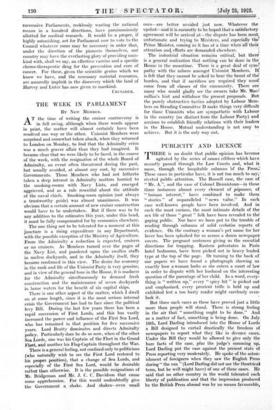THE WEEK IN PARLIAMENT
BY NEW MEMBER.
AT the time of writing the cruiser controversy is in full swing, although when these words appear in print, the matter will almost certainly have been resolved one way or the other. Unionist Members were surprised and somewhat taken aback, when they returned to London on Monday, to find that the Admiralty crisis was a much graver affair than they had imagined. It became clear that we were likely to be faced, in the course of the week, with the resignation of the whole Board of Admiralty, an event often threatened during the past, but usually avoided, at almost any cost, by successive Governments. Those Members who had not hitherto taken a deep interest in Admiralty matters hurried to the smoking-rooms with Navy Lists, and emerged aggrieved, and as a rule resentful about the attitude of the naval chiefs. Smoking-room opinion (not always a trustworthy guide) was almost unanimous. It was obvious that a certain amount of new cruiser construction would have to be undertaken. But if there was to be any addition to the estimates this year, under this head, it must be fully compensated for by economies elsewhere.
The one thing not to be tolerated for a moment at this juncture is a rising expenditure in any Department, with the possible exception of the Ministry of Agriculture. From the Admiralty a reduction is expected, cruisers or no cruisers. As Members turned over the pages of the Navy List, and pondered upon the swollen staffs in useless dockyards, and in the Admiralty itself, they became confirmed in this view. The desire for economy in the rank and file of the Unionist Party is very genuine, and in view of the general tone in the House, it is madness for the Admiralty simultaneously to demand fresh construction and the maintenance of seven dockyards in home waters for the benefit of six capital ships.
There is one other aspect of the matter, which I dwell on at some length, since it is the most serious internal crisis the Government has had to face since the political levy Bill. During the last few years there has been a rapid succession of First Lords, and this has vastly increased the power and influence of the First Sea Lord, who has remained in that position for five successive years. Lord Beatty dominates and directs Admiralty policy. Particularly does he do so now, when of the other Sea Lords, one was his Captain of the Fleet in the Grand Fleet., and another his Flag-Captain throughout the War.
There is a general feeling, not confined only to politicians (who naturally wish to see the First Lord restored to his proper- position), that a change of Sea Lords, and especially of the First Sea Lord, would be desirable rather than otherwise. It is the possible resignations of Mr. Bridgeman and Mr. J. C. C. Davidson that cause some apprehension. For this would undoubtedly give. the Government a shake. And shakes—even small ones—are better avoided just now. Whatever the upshot—and it is earnestly to be hoped that a satisfactory agreement will be arrived at—the dispute has been most, unfortunate and trying to Ministers, and especially the4 Prime Minister, coming as it has at a time when all their attention and efforts are demanded elsewhere.
The industrial situation remains critical, but there is a general realization that nothing can be done in the House in the meantime. There is a great deal of sym-4 pathy with the miners amongst Unionist Members. Ie is felt that they cannot be asked to bear the brunt of the burden, and that if sacrifices are required they must come from all classes of the community. There are many who would gladly see the owners take Mr. Mac-! millan's hint and withdraw the present proposals. But the purely obstructive tactics adopted by Labour Mem- bers on Standing Committee D make things very difficult for those Unionists who are sympathetic with Labour in the country (as distinct from the Labour Party) and anxious to establish friendly relations with their leaders in the House. Mutual understanding is not easy to achieve. But it is the only way out.


























































 Previous page
Previous page